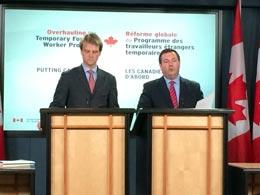Business losing a critical lifeline

Changes to the Temporary Foreign Worker Program (TFWP) will leave some small businesses completely out of options when it comes to hiring and retaining workers. The Canadian Federation of Independent Business (CFIB) is deeply troubled by the exclusion of entire regions from the program, the quadrupling fees, and the government’s seeming complete disregard for entire sectors of the economy.
“For a government that has made significant strides to reduce the red tape burden on small business, this is a complete 180 degree turn,” said CFIB president Dan Kelly. “This change represents a ‘gutting’ of the TFW program for many in the restaurant, hotel and retail sectors and is the most small business unfriendly move ever made by this government.”
The changes announced last week by Employment Minister Jason Kenney and Immigration Minister Chris Alexander include the complete exclusion from the program of the hotel, restaurant and retail sectors in regions considered to have “high unemployment” – defined as 6% or above.
The non-refundable fee to apply for a TFW has also gone from $275 to $1,000 per position, and employers will be forced to provide much more documentation. These changes do nothing to preserve Canadian jobs, and are simply adding more cost for small and medium-sized businesses that use the TFWP to address genuine labour shortages.
Reforms to the program include:
Barring employers from hiring low-wage temporary foreign workers in regions where the unemployment rate is above six per cent.
A cap of 10 per cent on the number of low-wage temporary foreign workers employers can hire per work site by 2016.
The cap will be gradually phased in, starting at 30 per cent effective immediately, then reduced to 20 per cent on July 1, 2015, and 10 per cent a year later in 2016.
An increase in the number of inspections: one in four employers will be inspected each year. The government says it will hire approximately 20 more inspectors, bringing the number to about 60.
An increase from $275 to $1,000 in the application fee employers must pay per worker requested, effective immediately.
Fines of up to $100,000 for employers who abuse the program, starting in fall.
Additional funding for the Canada Border Services Agency so it can pursue more criminal investigations.
Posting the names of employers who receive permission to hire foreign workers.
Making public the number of positions approved through the program on a quarterly basis.
Reducing the amount of time a temporary foreign worker can be employed in Canada, to two years from four.
The majority of the changes do not apply to employers who hire seasonal workers, live-in caregivers and nannies.
“Regional jobless rates mean very little to a small business owner who can’t find enough interested workers to keep the doors open,” said Kelly.
“Unless the federal government is prepared to force unemployed Canadians to move to take jobs they don’t want, these changes leave a huge gap for employers. Let’s face it, an unemployed computer programmer in Toronto isn’t applying for a job to make pizzas in rural Saskatchewan.”
CFIB members have acknowledged problems with the program, and have been strongly supportive of action to ensure that it is used appropriately. In a letter to Minister Kenney in May, CFIB proposed a number of changes, including better pathways to permanent residence for lower-skilled workers and stricter enforcement of existing rules. These recommendations were ignored.
“This is a gross over-reaction to a handful of negative stories,” added Kelly. “Thousands of businesses that are unable to attract a sufficient number of Canadian workers are losing a critical lifeline. It will likely lead to business closures and, ironically, lost jobs for Canadian workers.”
CFIB is Canada’s largest association of small and medium-sized businesses with 109,000 members across every sector and region.
CFIB members strongly support stiff penalties for those caught abusing the program or mistreating Canadian employees or TFWs, but these changes convict all employers, barring many who have followed all of the rules from even applying.
The changes single out the restaurant, hotel and retail sectors, permanently closing off their access to the program for most positions in most parts of Canada. For those who still have access, costs will go way up – a $1,000 non-refundable fee for each TFW position – and paperwork requirements will become even more onerous.
The federal government has failed to grasp some basic realities faced by employers of lower-skilled staff. There is no line-up of unemployed Canadians clamouring for these jobs, and the minister’s insistence that employers simply need to pay more shows a lack of understanding of the razor-thin margins and the impact on consumer prices and demand. Also, despite media stories to the contrary, business owners know the cost of employing a TFW is significantly higher than hiring a locally available worker.
CFIB has been widely recognized as the loudest voice fighting to protect the program, and despite this terrible decision, we will continue to fight. We will be actively lobbying for:
a special foreign worker program for restaurants, hotels, retail outlets and other employers of lower-skilled occupations, to meet their unique needs; and
a pathway to permanent residence for all TFWs, regardless of skill level.
This is in addition to other CFIB work to address the growing shortage of labour across Canada.
“We know that only a small portion of our members need to use the TFWP, but we are all threatened when a government takes action that completely disregards the legitimate needs of small business.”
Leave a comment









